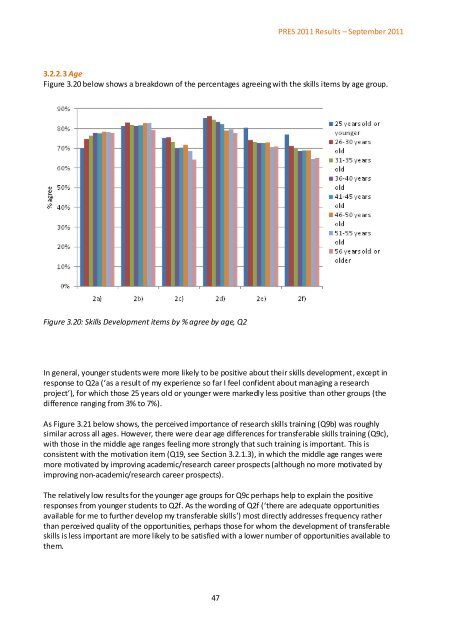Postgraduate Research Experience Survey (PRES) 2011 - Higher ...
Postgraduate Research Experience Survey (PRES) 2011 - Higher ...
Postgraduate Research Experience Survey (PRES) 2011 - Higher ...
Create successful ePaper yourself
Turn your PDF publications into a flip-book with our unique Google optimized e-Paper software.
<strong>PRES</strong> <strong>2011</strong> Results – September <strong>2011</strong><br />
3.2.2.3 Age<br />
Figure 3.20 below shows a breakdown of the percentages agreeing with the skills items by age group.<br />
Figure 3.20: Skills Development items by % agree by age, Q2<br />
In general, younger students were more likely to be positive about their skills development, except in<br />
response to Q2a (‘as a result of my experience so far I feel confident about managing a research<br />
project’), for which those 25 years old or younger were markedly less positive than other groups (the<br />
difference ranging from 3% to 7%).<br />
As Figure 3.21 below shows, the perceived importance of research skills training (Q9b) was roughly<br />
similar across all ages. However, there were clear age differences for transferable skills training (Q9c),<br />
with those in the middle age ranges feeling more strongly that such training is important. This is<br />
consistent with the motivation item (Q19, see Section 3.2.1.3), in which the middle age ranges were<br />
more motivated by improving academic/research career prospects (although no more motivated by<br />
improving non-academic/research career prospects).<br />
The relatively low results for the younger age groups for Q9c perhaps help to explain the positive<br />
responses from younger students to Q2f. As the wording of Q2f (‘there are adequate opportunities<br />
available for me to further develop my transferable skills’) most directly addresses frequency rather<br />
than perceived quality of the opportunities, perhaps those for whom the development of transferable<br />
skills is less important are more likely to be satisfied with a lower number of opportunities available to<br />
them.<br />
47
















